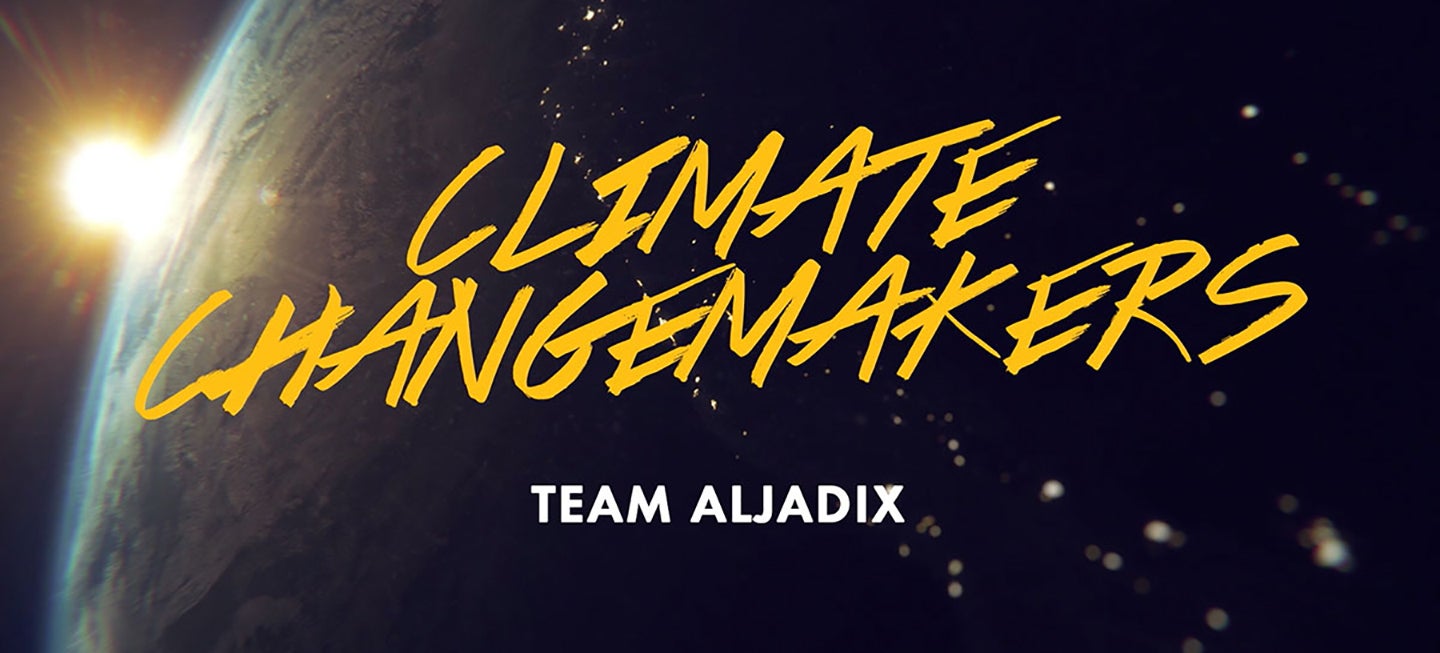Climate Changemakers is a series highlighting the extraordinary people on a $20 million quest to save the planet through carbon conversion. This guest post is written by Thomas Digby, lead of Team Aljadix, from Switzerland. Aljadix is one of 27 semi-finalist teams competing in the $20M NRG COSIA Carbon XPRIZE.
Here at Aljadix we are developing carbon negative biofuel from microalgae feedstock. You may not have heard of this product before. It’s not well known in the media. Carbon negative biofuel is a novel negative emissions technology which not only replaces liquid fossil fuel but also removes carbon from the atmosphere. Permanently.
How do we make carbon negative biofuel? We start by consuming tonnes of carbon dioxide from the atmosphere. The gas is bubbled into our innovative fully-sealed microalgae cultivation platform that floats on the sea surface. The microalgae inside the container use photosynthesis to consume the carbon dioxide. Under the right conditions, microalgae grows fast and is harvested every three days. The harvest is fed as a liquid concentrate into a high-temperature, high-pressure vessel for ten minutes where it undergoes hydrothermal liquefaction (HTL). The products of HTL are biocrude (a liquid, like fossil crude, and suitable for upgrading to renewable diesel) and hydrochar (a solid, like charcoal, that contains chemically inert carbon that does not biodegrade or return to the atmosphere).
Together, the biocrude and hydrochar co-products make carbon negativebiofuel. As you can see, the more biocrude that is consumed by industry to replace fossil crude, the more carbon is permanently removed from the atmosphere as inert carbon hydrochar. Brick by brick.
For those interested in the carbon cycle, we acknowledge that yes, the carbon in the biocrude ultimately is burned and returned to the atmosphere as carbon dioxide (thus carbon neutral with respect to the atmosphere). But the carbon in the hydrochar remains permanently sequestered. This hydrochar can be used in materials, or simply buried, for example, in a retired open-pit mine. And since the amount of carbon contained in the hydrochar exceeds the carbon cost of the energy required to drive the entire process (by full life cycle analysis), the process is therefore carbon negative, with respect to the atmosphere, in an absolute sense.
The Aljadix process is also highly scalable. This is our second unique feature. Existing biofuels are limited by lack of land and lack of freshwater. That is why existing biofuels (bioethanol and biodiesel) make up less than 3% of the worldwide liquid fuel supply. Aljadix overcomes these limitations with our innovative microalgae cultivation platform that floats on the sea-surface, using sea water based growth medium inside the fully sealed platform. We use no land and no freshwater. We locate the platforms in sunny coastal regions of the world where the process is driven by freely available sunlight. We extensively recycle nutrients from each stage of the process so that nothing is lost to the surrounding ocean. And of course, our coastal locations are selected to be low-impact environmental zones which do not interfere with sensitive ecosystems, sea-life migration, commercial fisheries or tourism.
Let us know what you think about Aljadix at our website www.aljadix.com
The Team:
Aljadix is an international (Switzerland, UK and Canada) startup which came together in 2015 as the nations of the world committed to the Paris Agreement. Tom, a biologist/attorney from the startup biotech world, met Mike, a marine microbial chemist, by chance encounter at an algae conference. Mike is a scientist, an inventor, and a leading academic in the complex field of marine microbiology at Plymouth Marine Labs, UK. Mike introduced Chris, his friend and colleague of many years, who is a chemical engineer, and whose lab at the University of Bath, UK, focuses on the conversion of biomass, including microalgae, to biofuels using HTL. Over several months, Tom, Mike and Chris formulated and re-formulated the design and process requirements that form the basis of Aljadix. Vasco is a serial entrepreneur, now living in Switzerland, who with Tom, designed, built and tested Aljadix’s prototype microalgae cultivation platform.
The Bigger Picture:
In our view, there are many industries which cannot eliminate their need for liquid hydrocarbon fuels by 2040, especially airlines, ocean tankers and chemicals/plastics. Our blue-sky vision at Aljadix is to convert this depressing reality (e.g. the momentum of legacy carbon requiring infrastructure) into a radical solution for climate change. Our approach is subversive, disruptive, and commercially viable. By converting these industries to carbon negative biofuel, we will transform them into a solution for climate change…and for our planet.
